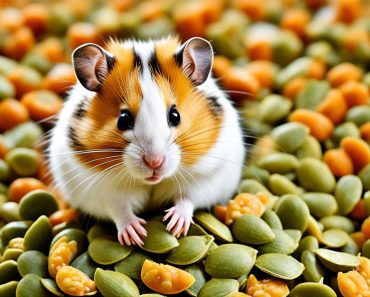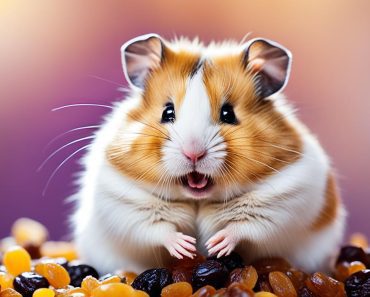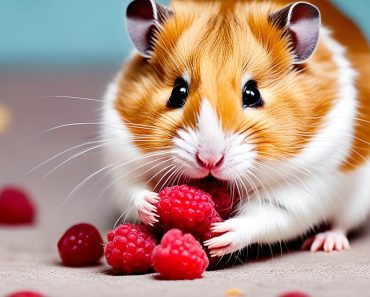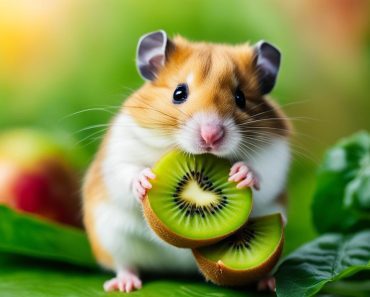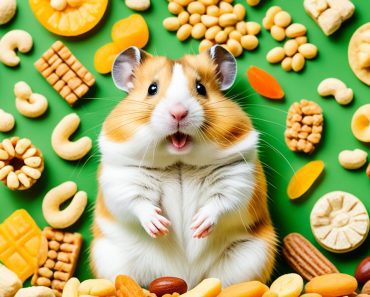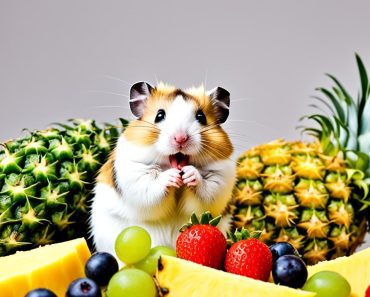Hamsters are adorable little pets that bring joy to our lives. As responsible pet owners, we want to ensure they have a balanced and nutritious diet. One question that often comes up is whether hamsters can eat rice. In this article, I will provide you with safe snacking tips and guidelines for including rice in your hamster’s diet.
So, can hamsters eat rice? The answer is yes, but with some caveats. Rice can be included in a hamster’s diet as an occasional treat in both raw and cooked forms. However, it should not be the main component of their diet. The main components of a hamster’s diet should be nutritional pellets, seeds, fresh vegetables, and fruits.
When feeding rice to your hamster, it is recommended to opt for whole grain rice. Whole grain rice is a better nutritional choice as it contains higher amounts of B vitamins, fiber, and iron. These nutrients are essential for your hamster’s overall health and well-being.
It’s important to note that rice should only be given in small amounts. A teaspoon of cooked rice once or twice a week is sufficient. Giving too much rice can lead to digestive issues and weight gain in hamsters. Always remember to provide a balanced diet that meets all their nutritional needs.
Can Hamsters Eat Rice? Yes, they can, as a once-in-a-while treat.
- Hamsters can eat rice as an occasional treat in both raw and cooked forms.
- Whole grain rice is a better nutritional choice due to its higher content of B vitamins, fiber, and iron.
- Rice should not replace the main components of a hamster’s diet, such as nutritional pellets, seeds, fresh vegetables, and fruits.
- Offer rice in small amounts, around a teaspoon of cooked rice once or twice a week.
- Ensure a balanced and varied diet to meet your hamster’s nutritional needs and overall health.
Safe Foods for Hamsters
When it comes to the health and nutrition of our furry little friends, it’s important to provide them with a balanced and varied diet. Hamsters can safely consume a variety of foods that are not only delicious but also meet their nutritional needs. Let’s take a look at some safe foods for hamsters.
Fruits
- Apples
- Bananas
- Blueberries
- Grapes
- Watermelons
Vegetables
- Broccoli
- Carrots
- Cucumbers
- Peas
- Spinach
Proteins
- Chicken
- Eggs
- Salmon
- Tofu
Miscellaneous Foods
- Almonds
- Quinoa
- Sunflower seeds
- Whole grain pastas
These are just some examples of safe foods for hamsters. Remember to provide these foods in moderation and consider their individual dietary requirements. A balanced and varied diet will help ensure that your hamster stays healthy and happy.
Stay tuned for the next section, where we will explore different hamster food options to keep your furry friend well-fed and nourished!
Hamster Food Options
When it comes to feeding your hamster, finding the right balance is key. The main diet of hamsters can consist of a mix of pellets and seeds, providing them with the necessary nutrients. Pelleted hamster foods offer a balanced diet in every bite, ensuring that your furry friend gets the essential vitamins and minerals they need to thrive.
However, it’s important to keep in mind that hamsters can sometimes get bored with their food. To prevent this, it’s recommended to supplement their diet with tastier options. A seed mix that includes pellets can be a great option, providing some variety and excitement in their meals.
In addition to pellets and seeds, fresh fruits and vegetables should also be included in a hamster’s diet. These should be offered in small amounts, as too much can upset their delicate digestive systems. Fresh greens like kale and lettuce, as well as small pieces of fruits like apples and strawberries, can be a colorful and nutritious addition to their meals.
A balanced diet is essential for hamsters, but it’s equally important to avoid certain foods. Sugary or salty foods can be harmful to their health, and toxic foods like almonds, raw potato, chocolate, onion, and kidney beans should be strictly avoided.
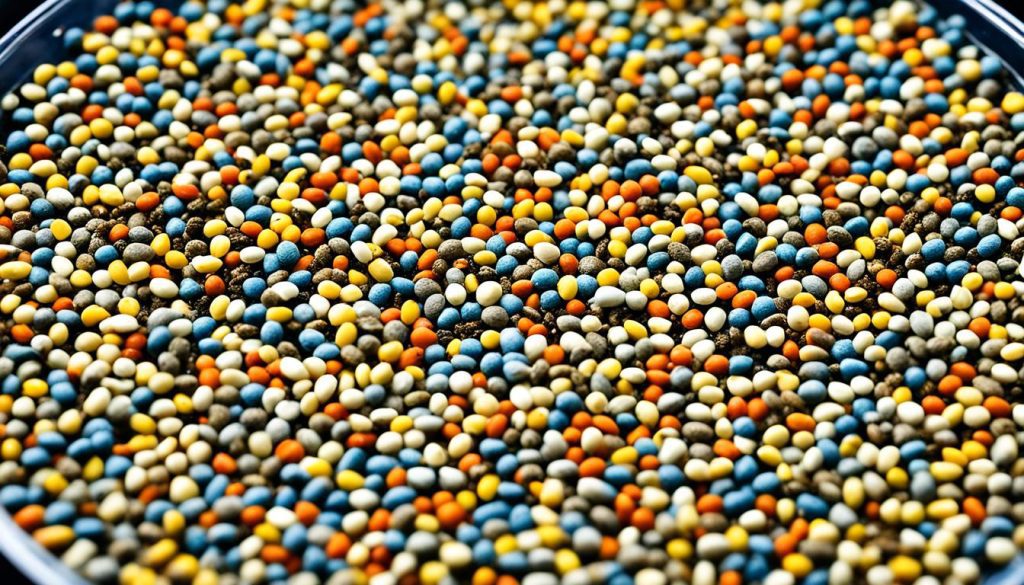
By providing a mix of pellets and seeds, supplementing with fresh fruits and vegetables, and avoiding harmful foods, you can ensure that your hamster enjoys a well-rounded diet that meets their nutritional needs. Remember, a healthy diet is the foundation for a happy and active hamster!
Other Treats for Hamsters
In addition to pellets, seeds, and fresh produce, there are a variety of other treats that hamsters can enjoy. These treats can add variety to their diet and provide them with a little something extra to look forward to.
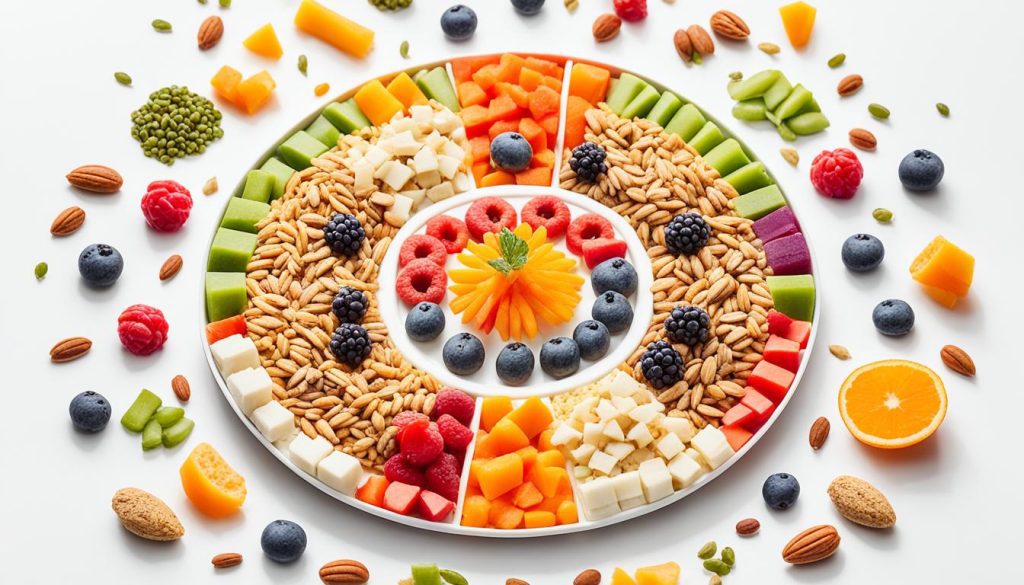
Whole Grain Toast and Cereals
Small bites of whole grain toast or plain whole grain cereals can make a tasty treat for your hamster. These treats are a good source of fiber and can add some crunch to their diet. Just be sure to avoid sugary cereals and opt for plain ones without added sugar.
Cooked Pasta and Rice
Cooked pasta and rice can also be offered to hamsters in small amounts. These foods should be plain, without any seasonings or sauces. Cooked pasta and rice provide carbohydrates and can be a nice change of pace for your furry friend.
Small Unsalted Nuts
Hamsters can enjoy small unsalted nuts as a treat. Peanuts and cashews are two popular options. Nuts provide healthy fats and a satisfying crunch, but make sure to give them sparingly due to their high fat content.
Caution with Peanut Butter and Sticky Foods
Peanut butter is a tasty treat for humans, but it can pose a risk to hamsters. The sticky nature of peanut butter can cause issues with their digestion. If you choose to offer peanut butter, do so sparingly and in small amounts. It’s always best to consult with a veterinarian before introducing any new foods into your hamster’s diet.
Other Occasional Treats
There are a few other occasional treats that you can give to your hamster. Hard-boiled eggs can be a good source of protein, but remember to remove the shell. Dog biscuits formulated for small animals can also be enjoyed by hamsters in moderation. Additionally, dandelion leaves can be a safe and nutritious treat for your furry friend.
Remember to avoid sugary cereals, greasy or oily foods, and anything with added salt or sugar. These treats can be unhealthy for hamsters and may lead to issues with their overall health.
By offering a variety of treats in addition to their regular diet, you can keep your hamster happy, engaged, and well-nourished.
Conclusion
After careful consideration, it is clear that rice can be safely included in a hamster’s diet as an occasional treat. Whether in raw or cooked form, rice provides a tasty snack option for our furry friends. However, it’s important to remember that rice should not be the main focus of their diet.
In order to maintain a balanced and healthy diet for our hamsters, it is crucial to provide them with a variety of foods. Hamsters thrive on a combination of pellets, seeds, fresh fruits, and vegetables. These components should make up the majority of their diet, ensuring they receive the necessary nutrients to support their overall well-being.
While rice can be a safe and enjoyable addition to a hamster’s diet, it’s equally important to be aware of foods that can be harmful to them. Avoid feeding toxic foods such as almonds, raw potato, chocolate, onion, and kidney beans, as these can have negative effects on their health.
By following these guidelines and incorporating a diverse range of foods into our hamsters’ diet, we can ensure they remain happy and healthy. As responsible pet owners, it is our duty to prioritize their nutritional needs and provide them with a safe and nourishing diet.

